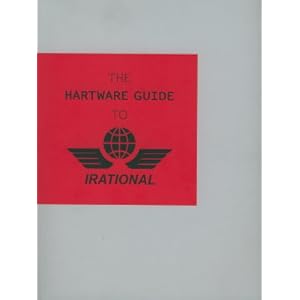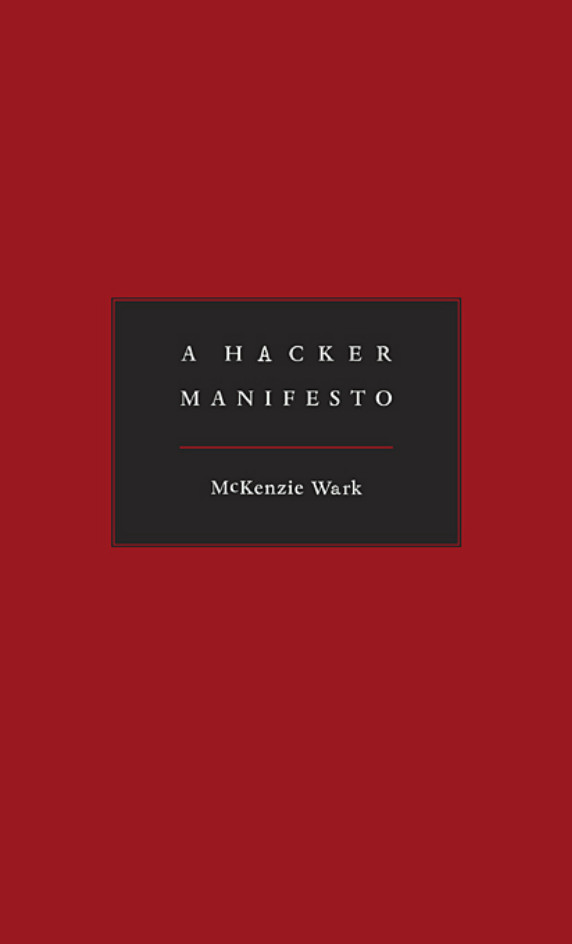The Hartware Guide to Irational.org (2006) [English/German]
Filed under catalogue | Tags: · art, copyright, intellectual property, internet, internet art, media art, net art

Published on the occasion of the exhibition “The Wonderful World of Irational.org. Tools, Techniques and Events 1996-2006” in the PHOENIX Halle Dortmund from 30. 08. till 29. 10. 2006, curated by Inke Arns and Jacob Lillemose.
“Irational is a loose grouping of six international net and media artists who came together around the server irational.org, founded by the British net artist Heath Bunting in 1996, going on to make decisive contribution to early net art from the mid-1990s onward. With dry humor and minimal aesthetics, irational commented the Internet hype of the mid-to-late 1990s, competing with the commercialization-euphoria of the new market by developing its own pseudo-ventures. Net art was immediate during this period, neither needing nor enjoying the safety of a mediating space or instance. This is why irational often hit upon humorless trademark attorneys, who wanted to keep irational from using brand names such as 7-11, American Express, Sainsbury’s and Tesco. These encounters, which the exhibition documents extensively, were little more than a prelude to more recent developments in the field of copyright, intellectual property, and brand protection. Heath Bunting was the first net artist to retire in 1997, putting an end to his exclusive work on the net and turning back to more intensive work in public space, which the Internet has become such an important part of today. If the activities of irational during its “net phase” were dedicated to calling virtual boundaries into question, its members now experiment with interrogating and overcoming economic, political, and social boundaries in real space, producing a great deal of comic relief, among other things.” (from the press release for the exhibition)
With texts by Susanne Ackers, Inke Arns, Matthew Fuller, Francis Hunger, Jacob Lillemose, Darija Šimunović
Editors Susanne Ackers, Inke Arns, Francis Hunger, Jacob Lillemose
Publisher Revolver – Archiv fuer aktuelle Kunst, Frankfurt am Main, October 2006
ISBN 3865882994, 978-3865882998
136 pages
PDF (6 MB, updated on 2023-3-10)
Comment (0)Peter Lunenfeld: The Secret War Between Downloading and Uploading: Tales of the Computer as Culture Machine (2011)
Filed under book | Tags: · blogging, computing, consumption, copyright, cultural production, culture machine, internet, networks, participation, simulation, technology, television, unimodernism, web, web 2.0

“The computer, writes Peter Lunenfeld, is the twenty-first century’s culture machine. It is a dream device, serving as the mode of production, the means of distribution, and the site of reception. We haven’t quite achieved the flying cars and robot butlers of futurist fantasies, but we do have a machine that can function as a typewriter and a printing press, a paintbrush and a gallery, a piano and a radio, the mail as well as the mail carrier. But, warns Lunenfeld, we should temper our celebration with caution; we are engaged in a secret war between downloading and uploading–between passive consumption and active creation–and the outcome will shape our collective futures.
In The Secret War Between Downloading and Uploading, Lunenfeld makes his case for using digital technologies to shift us from a consumption to a production model. He describes television as “the high fructose corn syrup of the imagination” and worries that it can cause “cultural diabetes”; prescribes mindful downloading, meaningful uploading, and “info-triage” as cures; and offers tips for crafting “bespoke futures” in what he terms the era of “Web n.0″ (interconnectivity to the nth power). He also offers a stand-alone genealogy of digital visionaries, distilling a history of the culture machine that runs from the Patriarchs (Vannevar Bush’s WWII generation) to the Hustlers (Bill Gates and Steve Jobs) to the Searchers (Larry Page and Sergey Brin of Google fame). After half a century of television-conditioned consumption/downloading, Lunenfeld tells us, we now find ourselves with a vast new infrastructure for uploading. We simply need to find the will to make the best of it.”
Publisher MIT Press, 2011
ISBN 0262015471, 9780262015479
219 pages
Review: Jan Baetens (Leonardo Reviews, 2011).
PDF (updated on 2019-11-20)
Comment (0)McKenzie Wark: A Hacker Manifesto (2004–) [EN, DE, FR, CR, ES]
Filed under book | Tags: · commons, copyright, floss, free software, gift economy, hacker ethic, hacking, intellectual property

“A double is haunting the world–the double of abstraction, the virtual reality of information, programming or poetry, math or music, curves or colorings upon which the fortunes of states and armies, companies and communities now depend. The bold aim of this book is to make manifest the origins, purpose, and interests of the emerging class responsible for making this new world–for producing the new concepts, new perceptions, and new sensations out of the stuff of raw data.
A Hacker Manifesto deftly defines the fraught territory between the ever more strident demands by drug and media companies for protection of their patents and copyrights and the pervasive popular culture of file sharing and pirating. This vexed ground, the realm of so-called “intellectual property,” gives rise to a whole new kind of class conflict, one that pits the creators of information–the hacker class of researchers and authors, artists and biologists, chemists and musicians, philosophers and programmers–against a possessing class who would monopolize what the hacker produces.
Drawing in equal measure on Guy Debord and Gilles Deleuze, A Hacker Manifesto offers a systematic restatement of Marxist thought for the age of cyberspace and globalization. In the widespread revolt against commodified information, McKenzie Wark sees a utopian promise, beyond the property form, and a new progressive class, the hacker class, who voice a shared interest in a new information commons.”
Publisher Harvard University Press, 2004
ISBN 0674015436, 9780674015432
208 pages
Interview with author: Melissa Gregg (LA Review of Books, 2014).
Reviews: Hua Hsu (Village Voice, 2004), Vince Carducci (PopMatters, 2005), Graham Meikle (Scan, 2005), Brent K. Jesiek (New Media & Society, 2006), A Hacker Manifesto at Twenty (e-flux special issue, 2024, PDF).
A Hacker Manifesto (English, 2004, updated on 2014-9-12)
Hacker-Manifest (German, trans. Dietmar Zimmer, 2005, added on 2018-7-13)
Un manifeste hacker (French, trans. Club Post-1984 Mary Shelley & Cie Hacker band, 2006, added on 2018-7-13)
Hakerski manifest (Croatian, trans. Tomislav Medak, 2006)
Un manifiesto hacker (Spanish, trans. Laura Manero, 2006, added on 2018-7-13)
Manifiesto hacker (Spanish, trans. of a shorter essay, undated, v4, added on 2014-3-6)

